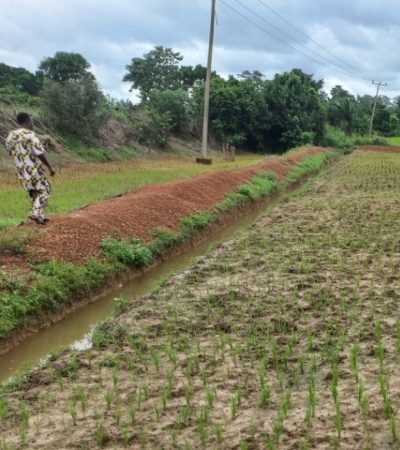For years, Chiv Vanndy tried to convince Cambodian farmers to use drip irrigation systems. As the head of the Papaya Trading Company, an agricultural inputsupply distributor with a national reach, he was in a position to provide the yield-boosting technology to thousands of farmers.
“But my customers didn’t want it. I made very few sales,” Chiv says. Farmers were hesitant to invest in a technology when they did not fully understand its long-term benefits.
But with help from a
Feed the Future project in Cambodia, Papaya’s drip irrigation sales have skyrocketed by 85 percent over the past three years. Feed the Future is promoting drip irrigation to smallholder horticulture farmers as part of a broader technical package that also includes improved seed varieties, plastic mulch, and trellising—all of which Papaya distributes. Feed the Future has also trained Papaya’s staff on a range of concepts, including integrated pest management, chemical safety and nutrition.
As a result, more than 3,500 Feed the Future-supported horticulture farmers are using drip systems purchased from Papaya. Over the past three years, Chiv has increased his staff by 30 percent to meet the growing demand. “Feed the Future has been great for my business,” he says.
Papaya is one of a number of Cambodian input supply businesses that have benefitted from working alongside Feed the Future. Previously, only two companies in the entire country sold drip irrigation systems. Now, five do. Distributors specializing in seeds, fertilizers, and fish feed have also popped up or expanded their business, strengthening their respective value chains.
Smallholder farmers in rural areas of Cambodia have greatly benefitted from this growth: They now have reliable access to a range of inputs that are essential to increasing their yields and improving their household incomes. To date, horticulture farmers using drip irrigation and other Feed the Future-recommended technologies have increased their productivity by 273 percent, resulting in household income gains of 321 percent.
Village retail input suppliers, the family-run businesses in rural areas that sell directly to farmers, have also benefitted. With their shelves now stocked with Feed the Future-endorsed products, partner retailers have increased their sales by 70 percent, and they are better prepared to offer farmers the support and advice they need to succeed.
Beginning in late 2014, Feed the Future began forming public-private alliances with select agribusinesses to strengthen key links in rural value chains. As part of the alliances, 11 input distributors, fish hatcheries and rice mills will purchase new equipment and other upgrades to improve their operations. More than half of the $2.44 million they’ll invest in these upgrades will come from the businesses themselves, with Feed the Future providing the additional funding.
Feed the Future is helping participating businesses achieve a series of goals, including increasing its fingerling output by 1,000 percent in order to improve access to a crucial input for local aquaculture farmers. The seven small and medium-sized rice mills aim to improve their production capacity and incomes, helping at least 4,600 smallholder rice farmers increase their incomes. Furthermore, three agricultural input supply distributors will work to improve access to advanced technologies and extension services for Cambodian farmers.
Feed the Future will continue to collaborate with its existing agribusiness partners wherever it can. Chiv sees a bright future for his company—and the famers and input retailers who rely on it. “The market for our products is rapidly expanding,” he says. “I’m very happy with how my business has grown.”




